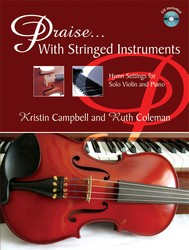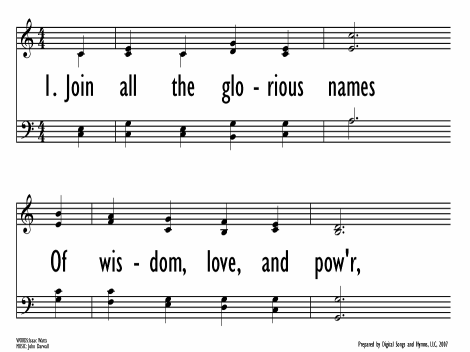- |
User Links
Join All the Glorious Names

Join all the glorious names
Author: Isaac WattsPublished in 340 hymnals
Printable scores: PDF, MusicXMLAudio files: MIDI, Recording
Representative Text
1. Join all the glorious names
Of wisdom, love, and pow'r
That ever mortals knew,
That angels ever bore:
All are too poor
To Speak his worth,
Too poor to set
My Savior forth.
2. Jesus, my great High Priest
Offered his blood and died;
My guilty conscience seeks
No sacrifice beside:
His pow'rful blood
Did once atone,
And now it pleads
Before the throne.
3. My Advocate appears
For my defense on high;
The Father bows his ears
And lays his thunder by;
Not all that Hell
Or sin can say
Shall turn his heart,
His love away.
4. Should all the hosts of death
And pow'rs of Hell unknown
Put their most dreadful forms
Of rage and mischief on,
I shall be safe,
For Christ displays
Superior pow'r
And guardian grace.
Source: Hymns and Devotions for Daily Worship #340
Author: Isaac Watts
 Isaac Watts was the son of a schoolmaster, and was born in Southampton, July 17, 1674. He is said to have shown remarkable precocity in childhood, beginning the study of Latin, in his fourth year, and writing respectable verses at the age of seven. At the age of sixteen, he went to London to study in the Academy of the Rev. Thomas Rowe, an Independent minister. In 1698, he became assistant minister of the Independent Church, Berry St., London. In 1702, he became pastor. In 1712, he accepted an invitation to visit Sir Thomas Abney, at his residence of Abney Park, and at Sir Thomas' pressing request, made it his home for the remainder of his life. It was a residence most favourable for his health, and for the prosecution of his literary… Go to person page >
Isaac Watts was the son of a schoolmaster, and was born in Southampton, July 17, 1674. He is said to have shown remarkable precocity in childhood, beginning the study of Latin, in his fourth year, and writing respectable verses at the age of seven. At the age of sixteen, he went to London to study in the Academy of the Rev. Thomas Rowe, an Independent minister. In 1698, he became assistant minister of the Independent Church, Berry St., London. In 1702, he became pastor. In 1712, he accepted an invitation to visit Sir Thomas Abney, at his residence of Abney Park, and at Sir Thomas' pressing request, made it his home for the remainder of his life. It was a residence most favourable for his health, and for the prosecution of his literary… Go to person page >Text Information
Related Texts
| First Line: | Join all the glorious names |
| Title: | Join All the Glorious Names |
| Author: | Isaac Watts |
| Meter: | 6.6.6.6.8.8 |
| Language: | English |
| Copyright: | Public Domain |
- (hymns)
- (hymns)
- (hymns)
- (hymns)
- (hymns)
- (hymns)
- (hymns)
- (hymns)
- (hymns)
- (hymns)
- (hymns)
- (hymns)
- (hymns)
- (hymns)
- (hymns)
- (hymns)
- (hymns)
- (hymns)
- (hymns)
- (hymns)
- (hymns)
- (hymns)
- (hymns)
- (hymns)
- (hymns)
- (hymns)
- (hymns)
- (hymns)
- (hymns)
- (hymns)
- (hymns)
- (hymns)
- (hymns)
- (hymns)
- (hymns)
- (hymns)
- (hymns)
- (hymns)
- (hymns)
- (hymns)
- (hymns)
- (hymns)
- (hymns)
- (hymns)
- (hymns)
- (hymns)
- (hymns)
- (hymns)
- (hymns)
- (hymns)
- (hymns)
- (hymns)
- (hymns)
- (hymns)
English
- A Choice Collection of Hymns and Spiritual Songs: intended for the edification of sincere Christians of all denominations #XLVII
- A Choice Selection of Evangelical Hymns, from various authors: for the use of the English Evangelical Lutheran Church in New York #46
- A Choice Selection of Hymns and Spiritual Songs: designed for the use of the pious #CXXX
- A Collection of Hymns #14
- A Collection of Hymns and a Liturgy for the Use of Evangelical Lutheran Churches: to which are added prayers for families and individuals #114
- A Collection of Hymns and a Liturgy: for the use of Evangelical Lutheran Churches, to which are added prayers for families and individuals (New and Enl. Stereotype Ed.) #114
- A Collection of Hymns and A Liturgy: for the use of Evangelical Lutheran Churches; to which are added prayers for families and individuals #114
- A Collection of Hymns and Psalms for the Use of Singing School and Musical Societies #d71
- A Collection of Hymns for Public, Social and Domestic Worship #d461
- A Collection of Hymns for Public, Social, and Domestic Worship #170 10 shown out of 188
Latin
Notes
Join all the glorious Names. J. Watts. [Names and Titles of Jesus Christ.] Published in his Hymns & Sacred Songs, 1709, Book i., No. 150, in 12 stanzas of 8 lines, as the second of two hymns on "The Offices of Christ, from several Scriptures." It has been freely altered, abbreviated, and divided from M. Madan's Psalms & Hymns 1760, to the present time. The line which has caused most trouble to the editors has been stanza x., line 1, "My dear, Almighty Lord," the term "dear" being very objectionable to many. The line has undergone the following amongst other changes:—
1760. M. Madan. "Thou dear Almighty Lord."
1769. Ash & Evans. "My great Almighty Lord."
1830. Wesleyan Hymn Book "O Thou Almighty Lord."
1833. Bickersteth. "Divine Almighty Lord."
1835. H. V. Elliott. "Almighty, Sovereign Lord."
1851. J. H. Gurney. “Almighty, gracious Lord."
1858. Baptist Psalms & Hymns. "My Saviour and my Lord."
1876. Presbyterian Hymnal. "Jesus, Almighty Lord."
To this list may be traced most of the changes found in modern hymn-books. There are others also of less importance. In addition to abbreviations which begin with the original first line, there are also the following centos:—
1. Arrayed in mortal flesh. This was given in H. Conyers's Collection, 1774, in 5 stanzas, and in other hymn-books.
2. Great Prophet of my God. In Alford's Year of Praise, 1867, &c.
3. Jesus, my Great High Priest. This, in Spurgeon's Our Own Hymn Book, 1866, is composed of stanzas viii., vi., and ix. of this hymn, and stanza vi.," Immense compassion reigns," from No. 148 of Book i. of Watts's Hymns, "With cheerful voice I sing."
4. My dear Almighty Lord. In Spurgeon's Our Own Hymn Book, 1866, No. 372.
The original hymn is justly regarded as one of Watts's finest efforts. In its various forms its use is extensive in most English-speaking countries. It has been translation in whole, or in part, into various languages, including Latin, in R. Bingham's Hymnologia Christiana Latina, 1870, as "Pange nomen omne mirum."
--John Julian, Dictionary of Hymnology (1907)
Access an additional article on the Canterbury Dictionary of Hymnology:
Tune
DARWALLComposed by John Darwall (b. Haughton, Staffordshire, England, 1731; d. Walsall, Staffordshire, England, 1789), DARWALL'S 148TH was first published as a setting for Psalm 148 in Aaron William's New Universal Psalmodist (1770) with only soprano and bass parts. The harmonization dates from the ninete…
CROFT'S 136TH


 My Starred Hymns
My Starred Hymns







